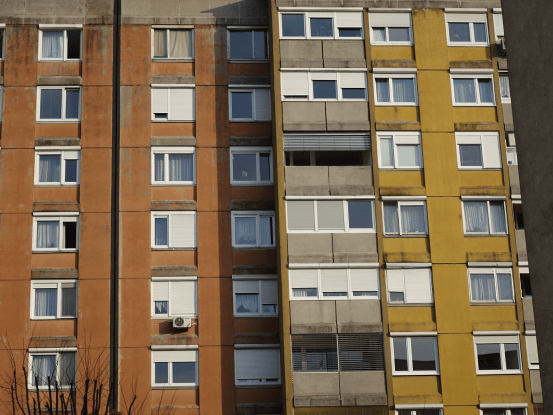4. THE REASONS FOR THE CURRENT SITUATION:
The collapse of Yugoslavia, and Slovenia’s independence in 1991, have led to changes in the political system. New organisation of Slovene society with the socio-economic system based on private property have greatly influenced the country’s development and have also been reflected in the spatial policy and legislation. One of the key privatisation laws, which set the transition from socialism to capitalism, was the Housing Act adopted already in 1991. A direct consequence of the law is very high fragmentation of ownershipin multi-apartment buildings (90% of apartments are privately owned), large number of building managers within a neighbourhood, and still-unsolved disputes regarding ownership of public areas in neighbourhoods.
Today’s unfortunate state of affairs in neighbourhoods has not been caused by inadequate or outdated “Socialist” urban layouts and architectural concepts, or the social conditions there, but by incomplete executions of programmes envisaged in design projects and problematic, poorly-conceived way of privatising collective property immediately after Slovenia’s independence.

Spatial legislation and its implementation
The lack of legal and regulatory measures as well as the absence of their implementation plays an essential role in unawareness of the importance of a harmoniously arranged environment, low level of spatial culture, and consequently spatial chaos in Slovenia.
Legislation in the field of construction and spatial interventions is poorly regulated. In particular, the set of interventions in buildings belonging to the category of maintenance for which it is not necessary to obtain a building permit is problematic. Maintenance works include renovation and energy renovation of facades, glazing of balconies and loggias, window replacement, etc., which all have a significant effect on changing the visual appearance of the building and consequently its surroundings. Control of interventions in space, for which the acquisition of a building permit is not required, is not within the competence of the construction inspection. In the new Building Act (2017) and its subordinate legislation, the provisions remained unchanged, despite the constant warnings of the professional public about the devastating consequences of such regulation.
The Housing Act stipulates that the owner may perform maintenance work, changes and improvements on his individual property if this does not impair other parts of the building and does not change the appearance of the building. For violations of this provision, financial penalties are foreseen, but in reality, there is no control over the interventions, nor is anyone exercising sanctions. The new Ljubljana Municipal Spatial Plan defines the conditions for the maintenance of multi-ownership buildings (reconstruction of the facade only in the original colour, glazing of the balconies must base on a uniform solution for the whole building, window change is permissible only consistent with the determination from the building permit, etc. ) There is no control over the fulfilement of these provisions, and there won’t be any until the establishment of the City Inspection Service. These provisions are generally taken into account only when a municipality is involved in the renovation of the building with financial subsidies.
To summarise, the vague and uncoordinated legislation and, especially, disrespect of laws, absence of control over interventions, together with the lack of sanctions for violations, impart a sense of legality to such acts within the Slovene society.
All this has largelly contributed to today’s miserable image of multi-apartment buildings or neighbourhoods. Individual homeowners pursue their interests and fulfill their wishes and needs, but forget that any intervention on the building envelope is also reflected in the shared space. Improper treatments on the facades result in degraded buildings, and degraded buildings reduce the quality of our shared space.